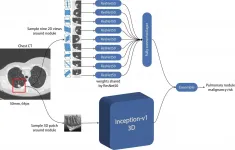Experts call for better design of early drug trials for Alzheimer's and related dementias
Scientific paper published in Neurology® provides guidance to clinical trial investigators
2021-05-18
(Press-News.org) NEW YORK, NY (May 18, 2021) - An expert panel convened by the Alzheimer's Drug Discovery Foundation (ADDF) and The Association for Frontotemporal Degeneration (AFTD) provides guidance on best practices for the design of early drug trials for Alzheimer's disease, frontotemporal degeneration (FTD), and other neurodegenerative dementias. Their guidance was published in the May 18, 2021 issue of Neurology®, the medical journal of the American Academy of Neurology ("Value-Generating Exploratory Trials in Neurodegenerative Dementias").
These efficiencies in clinical trials can help to achieve proof of concept more rapidly and at lower costs. The estimated cost of developing an Alzheimer's drug is eight times more than a cancer drug and takes nearly twice as long to develop. The panel, which comprised clinicians, researchers, and statisticians from academia, biotech, and pharmaceutical companies, as well as ADDF and AFTD scientific staff, focused on early phase 1 and 2 exploratory trials, which assess a drug's safety and pharmacologic effects on patients. Exploratory studies with optimized study designs can terminate programs not likely to succeed and efficiently move promising programs through the clinical trial process. Later phase 2 and phase 3 trials measure clinical outcomes such as memory and ability to perform daily functions.
"The majority of clinical development costs come from later stage phase 2b and phase 3 studies, which require long treatment periods and a large number of patients to detect meaningful changes in cognitive, behavioral, and functional endpoints," said Howard Fillit, M.D., ADDF founding executive director and chief science officer. "Results from exploratory phase 2a trials are the critical inflection point when researchers decide which drugs to move into these larger and more expensive trials, so clearly these phase 2a trials need to be as rigorous and well-designed as possible."
Panel makes four key recommendations for exploratory trial study designs
By adopting best practices in designing exploratory trials, researchers and companies can be more confident in using their results to make the all-important go/no-go decisions about advancing drugs to larger later-stage trials. The four key panel recommendations are to:
1. Employ rigorous statistical analyses and procedures, engaging statisticians in trial design as early as possible.
2. Incorporate the appropriate biomarker and clinical endpoints that reflect the drug's mechanism of action and the specific study population.
3. Leverage historical data to determine appropriate outcome measures that are well-aligned with the disease and mechanism of action for the treatment.
4. Consider novel clinical development plans to increase efficiency in moving a drug candidate into larger clinical trials or determining that it is ineffective as quickly as possible; avoid "cookie cutter" trial designs that are not optimized or tailored.
"These four recommendations can lead to more efficient trials, with substantial financial savings, as well as more strategic and effective engagement of patients," said AFTD CEO Susan L-J Dickinson. "The latter is a key concern for a rare disease like FTD where the low number of patients pushes the need for strategic study design, with patients enrolled only in studies that will provide a clear and accurate readout of therapeutic efficacy."
"We clearly need exploratory trials to be rigorous and efficient," said Dr. Fillit. "But this is about working toward the ultimate success--effective treatment strategies, which will likely be a combination drug approach that hits several of the biological pathways involved in the neurodegenerative process of dementia. That means being able to take multiple shots on goal--testing a wide variety of plausible drug candidates to identify the most promising ones."
INFORMATION:
About the Alzheimer's Drug Discovery Foundation (ADDF)
Founded in 1998 by Leonard A. and Ronald S. Lauder, the Alzheimer's Drug Discovery Foundation is dedicated to rapidly accelerating the discovery of drugs to prevent, treat and cure Alzheimer's disease. The ADDF is the only public charity solely focused on funding the development of drugs for Alzheimer's, employing a venture philanthropy model to support research in academia and the biotech industry. Through the generosity of its donors, the ADDF has awarded more than $168 million to fund over 650 Alzheimer's drug discovery and biomarker programs and clinical trials in 19 countries. To learn more, please visit: http://www.alzdiscovery.org/.
About AFTD
Founded in 2002, The Association for Frontotemporal Degeneration (AFTD) is the leading U.S. nonprofit working to improve the lives of people with FTD, their care partners and loved ones. AFTD promotes and funds research toward diagnosis, treatment and a cure for FTD; stimulates greater public awareness; provides information and support to those directly impacted; fosters education for healthcare professionals; and advocates for appropriate, affordable services. We envision a world with compassionate care, effective support and a future free of FTD. To learn more, visit theaftd.org.
ELSE PRESS RELEASES FROM THIS DATE:
2021-05-18
More than a year into the pandemic, the disproportionate burden of COVID-19 among racial and ethnic minorities in the US has been well documented. But a new study by Boston University School of Public Health (BUSPH) reveals that previous research has underestimated the true extent of racial disparities in COVID-19 deaths--as well as the extent to which structural racism contributes to these deaths.
Published in the Journal of Racial and Ethnic Health Disparities, the paper is the first to quantify the state-level differences in racial disparities in COVID-19 mortality among Black and White populations, using directly ...
2021-05-18
Researchers at Tulane University School of Medicine have developed a highly sensitive blood test that can find traces of the bacteria that causes tuberculosis (TB) in infants a year before they develop the deadly disease, according to a study published in BMC Medicine.
Using only a small blood sample, the test detects a protein secreted by Mycobacterium tuberculosis, which causes TB infection. It can screen for all forms of TB and rapidly evaluate a patient's response to treatment, said lead study author Tony Hu, PhD, Weatherhead Presidential Chair in Biotechnology Innovation at Tulane University.
"This is a breakthrough for infants with tuberculosis because ...
2021-05-18
A new cancer vaccine could boost the positive effects of existing immunotherapy drugs, improving the success rate of treatments from 20% to 75% of cases, according to a new study by immunologists from the University of Konstanz. The vaccine, which incorporates a new immunostimulant that is safe for use in humans, was shown to partially eliminate tumours in mice. However, the study further demonstrated that combining the vaccine with an immune checkpoint inhibitor -- an established immunotherapy drug with a 20% success rate overall for patients -- can vastly ...
2021-05-18
Climate change induced yield reductions can be compensated by cultivar adaptation and global production can even be increased.
Global agriculture both is one of the major drivers of climate change and strongly affected by it. Rising temperatures are among the main reasons for yield reductions. Therefore, the agricultural sector is faced with the major challenge of adapting to climate change in order to ensure food security in the future. According to a new study carried out by international researchers, the use of locally adapted cultivars can significantly contribute to achieve this goal. The study ...
2021-05-18
(Boston)--Researchers from Boston University School of Medicine (BUSM) report the formation of human cells containing a green fluorescent protein or GFP (one of the most important proteins in biology and fluorescence imaging) genetically fused with two interferon stimulated genes (ISGs), namely Viperin and ISG15. This new creation makes these cells highly valuable reagents for reporting innate immune responses to viral infections, including those caused by coronaviruses.
These engineered cells, which turn green when treated with interferon, are highly novel because this is the first time a reporter gene (a gene ...
2021-05-18
A filter made from polymer nanothreads blew three kinds of commercial masks out of the water by capturing 99.9% of coronavirus aerosols in an experiment.
"Our work is the first study to use coronavirus aerosols for evaluating filtration efficiency of face masks and air filters," said corresponding author Yun Shen, a UC Riverside assistant professor of chemical and environmental engineering. "Previous studies have used surrogates of saline solution, polystyrene beads, and bacteriophages -- a group of viruses that infect bacteria."
The study, led by engineers at UC Riverside and The George Washington University, compared ...
2021-05-18
The wild relatives of modern peanut plants have the ability to withstand disease in ways that peanut plants can't. The genetic diversity of these wild relatives means that they can shrug off the diseases that kill farmers' peanut crops, but they also produce tiny nuts that are difficult to harvest because they burrow deep in the soil.
Consider it a genetic trade-off: During its evolution, the modern peanut lost its genetic diversity and much of the ability to fight off fungus and viruses, but gained qualities that make peanut so affordable, sustainable and tasty that people all over the world grow and eat them.
Modern peanut plants were created 5,000 to ...
2021-05-18
OAK BROOK, Ill. - An artificial intelligence (AI) program accurately predicts the risk that lung nodules detected on screening CT will become cancerous, according to a study published in the journal Radiology.
Lung cancer is the leading cause of cancer death worldwide, with an estimated 1.8 million deaths in 2020, according to the World Health Organization. Low-dose chest CT is used to screen people at a high risk of lung cancer, such as longtime smokers. It has been shown to significantly reduce lung cancer mortality, primarily by helping to detect cancers at an early stage when they are easier to treat successfully.
While lung cancer typically shows up as pulmonary nodules on CT images, most nodules are benign ...
2021-05-18
Researchers have identified specific influenza targets that could be used to better protect Indigenous people from experiencing severe influenza disease through a universal, T cell-based vaccine.
In a collaboration with Monash Biomedicine Discovery Institute, Menzies School of Health Research and CQUniversity, Peter Doherty Institute for Infection and Immunity (Doherty Institute) researchers took a deep-dive look into how the immune system can protect Aboriginal and Torres Strait Islander people from severe influenza disease.
"We know that some populations are at high risk from severe influenza, and these include Indigenous people ...
2021-05-18
Fields of opium poppies once bloomed where the Zurich Opera House underground garage now stands. Through a new analysis of archaeological seeds, researchers at the University of Basel have been able to bolster the hypothesis that prehistoric farmers throughout the Alps participated in domesticating the opium poppy.
Although known today primarily as the source of opium and opiates, the poppy is also a valuable food and medicinal plant. Its seeds can be used to make porridge and cooking oil. Unlike all other previously domesticated crops, which are assumed to ...
LAST 30 PRESS RELEASES:
[Press-News.org] Experts call for better design of early drug trials for Alzheimer's and related dementias
Scientific paper published in Neurology® provides guidance to clinical trial investigators



